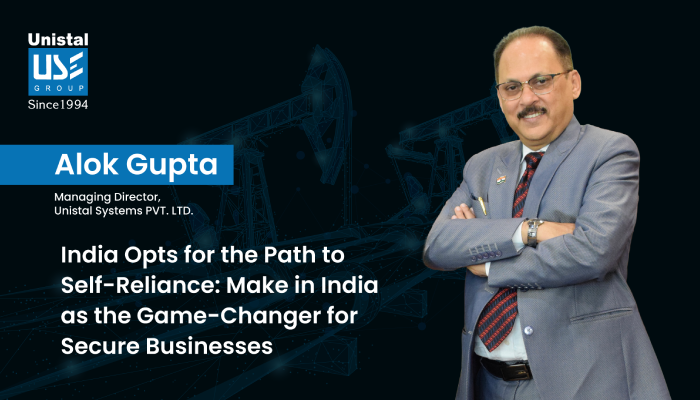Self-Reliance Isn’t a Choice—It’s the Firewall Against Uncertainty
Have you ever wondered what happens when a business that powers an entire nation suddenly loses access to the very systems it runs on? Sounds like a nightmare, right? But this isn’t just a bad dream—it’s a reality check. That is because your business heavily relies on foreign software or systems.
In a similar incident, in July 2025, Nayara Energy faced a shock when Microsoft temporarily suspended its cloud services. The move wasn’t even directly about Nayara—it was fallout from EU sanctions against Russia, one of its shareholders. Even though, in less than a week, operations were back, the damage was done.
And for Indian businesses, the message was loud and clear: when you build on foreign software, your control is only borrowed.
“When you build on foreign software, your control is only borrowed. The future belongs to those who own it.”
Alok Gupta, MD, Unistal Systems Pvt. Ltd.
Now ask yourself—what if tomorrow, it happens to you?
If Nayara wasn’t safe, who really is?
Why This Dependency is Dangerous
The danger of this approach goes beyond inefficiency. When core operational data and processes sit in foreign-controlled systems, companies risk losing access to their own lifeblood—data. If a foreign vendor withdraws support or restrictions emerge due to global political shifts (like the recent incident where, USA imposed a 50% tariff on Indian goods), Indian companies could find themselves locked out of their own systems. That is exactly what happened with Nayara, and it is a warning the industry cannot afford to ignore.
The Indian government has been clear: self-reliance is the way forward. “Make in India” isn’t just a slogan—it’s a survival strategy for industries, where sovereignty is over operations and data is non-negotiable. The Strategic Advantage of Going Indigenous & adopting indigenous solutions isn’t just about patriotism—it’s smart business.
The benefits are tangible:
- Operational efficiency through end-to-end integration.
- Lower costs by eliminating multiple redundant systems.
- Data dominance ensures companies have total control over their own information.
- Business continuity, free from foreign political or commercial vulnerabilities.
- Alignment with national priorities, supporting India’s vision of technological independence.
The Bigger Picture: India’s Borrowed Tech Habit
India may be the fastest-growing major economy, but here’s a hard truth: we spend over $10 billion every year on imported software and IT services (stated in a 2024 Ministry of Commerce & Industry submission to the WTO). That’s not just money leaving the country—that’s control, innovation, and security slipping away too.
And when the world turns uncertain, these dependencies quickly become shackles. Trade wars, sanctions, licensing disputes—a single foreign policy decision can bring operations here to a grinding halt.
This is why the Government’s push is for “Make in India” and self-reliance. It is not just patriotic talk—it’s a survival strategy. Because every time we choose foreign over indigenous, we aren’t just outsourcing technology—we’re outsourcing control.
For instance, City Gas Distribution operators require integrated solutions that seamlessly connect planning, construction, materials management, CRM, operations, maintenance, documentation, and GIS. They need comprehensive—not siloed—systems that help automate processes, digitalize workflows, enable data-driven analysis, and bring intelligence to uncover actionable business insights.
Where CGD Operators Stand Today
- Companies are juggling between 7–10 different siloed solutions: planning, construction, material management, GIS solutions, consumer management, O&M, documentation, and more.
- Each comes from a different vendor, awarded through separate tenders.
- Then comes the arduous task of integrating each of them and developing general service dashboards.
The result? A fragile, expensive ecosystem that’s hard to manage, harder to scale, and risky to depend on. If even one foreign vendor pulls the plug, the entire chain can collapse.
This is exactly where indigenous innovation needs to step in. Unistal Systems, a home-grown MSME company, understood this gap years ago and built SmartGasNet—a comprehensive, integrated solution designed for CGD operators.
Unlike fragmented setups, SmartGasNet brings every process — planning, construction, material management, GIS, CRM, O&M, documentation—under one roof. No silos, no costly patchwork. Only complete control that stays in India.
Leading CGD companies like IGL, Purva Bharti, MGL, and Assam Gas (AGCL) have already implemented it—either fully, partially, or module by module. The results speak for themselves: simplified management, reduced costs, and most importantly, data independence.
The lesson from Nayara Energy is clear: dependency is dangerous.
The future belongs to those who invest in self-reliance today and safeguard their tomorrow. If you don’t control your software, your systems, and your data today, you won’t stand a chance to control your future.
For oil and gas companies—and for Indian businesses at large—the time to act is now. They must seize this moment to pivot from fragmented, foreign-driven solutions to comprehensive, indigenous platforms that secure both their present operations and their long-term future.
This is not just a management decision—it is a strategic imperative. If we don’t own your data, your platforms, and your processes, then business security in ahead time is questionable.
Because in the end, the question isn’t whether we can afford to invest in indigenous solutions. The question is: can we afford not to?




